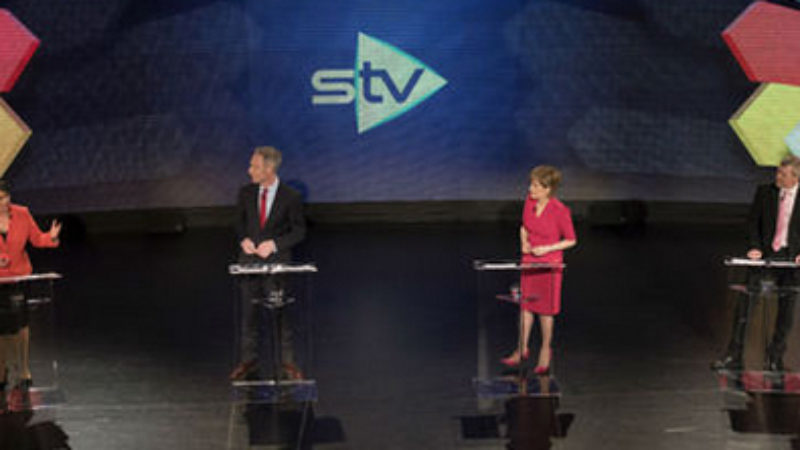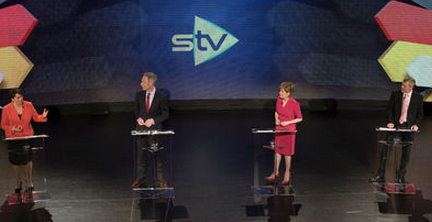
We are still getting used to leaders debates as part of our elections. They are still novel being talked up in some quarters and dismissed in others. In 2010, on their first time out, it looked like they were going to catapult the Lib Dems forward, then didn’t. This election we had a non-debate between Cameron and Miliband that should have been terrible but turned out to be rather good (for Ed that is). And after the unsatisfactory seven-way soundbite showdown last week, we had the Scottish Leaders debate last night.
This should have been a coda or postscript. This is a UK election and so the UK debates should be where the key fault lines are exposed. But whereas the number of podiums and confused format led to noise but little light, the Scottish leader debates, with four leaders all on home turf, the fault lines of the election in Scotland were revealed. We also saw Jim Murphy put his stamp on Labour’s General Election message.

As is so often the case, the initial hurdle each leader had to overcome was the format. Split in four sections, flow was interrupted and initially it seemed slow. It opened oddly with introductory statements from the audience not the leaders followed by questions from the moderator.
The debate got interesting in the third section, where each party leader was quizzed individually by the audience. Both Ruth Davidson, the Scottish Conservative leader, and Willie Rennie, the Leader of the Scottish Liberal democrats came under pressure. Davidson had opened interestingly, focusing on rising prosperity and living standards, a tack markedly to the left of her UK colleagues. But she looked distinctly ill at ease in defending Tory economics; her arguments lacked conviction or commitment. But it was Rennie who came under real fire for the Tory-Lib Dem record in Government. The audience rounded on him for the welfare policies and economic consequences of the decision to form a government with the Tories.
The most revealing aspect of the debate was seeing the contrast between Jim Murphy and Nicola Sturgeon. Jim opened and sustained lines of argument grounded in a vision of opportunity for all and tackling poverty – whereas sturgeon was forced on to the defensive, accounting for her record in government. In the open debate section, she attempted to use similar lines on education as she had used in the UK debates only to be forced back because of the SNP record of cutting college places and dropping teacher numbers.
Nor did she manage to successfully land her position on keeping the Tories out – or austerity. On both she set up, clearly pre-planned devices for Jim Murphy. But under the pressure of debate she failed to sustain them. Jim deployed a brutal and effective put down “you are entitled to your own opinion but not your own facts” as he produced the Charter for Budget Responsibility and with it refuting her attempts to claim Labour backs austerity, to cheers from the audience.
But the most telling point was when she refused to rule out another referendum in 2016. This resulted in booing and heckling form the audience. Sturgeon looked awkward and momentarily off balance; this was clearly not the popular wave she has become used to surfing.
That is not to say she had a bad debate. Nicola Sturgeon is an accomplished performer. She came under pressure from all three opponents and remained sure footed and confident. She also landed some pretty good lines and she probably received the biggest cheer at the end. But this was not the same Sturgeon as in the debates last week. Gone was the calm assured stateswoman. We had the pointy shouty Nicola from the referendum campaign trail, the one that talked over Alistair Carmichael and anyone else that attempted to occupy her air time.
Jim’s performance by contrast was calmer, more sure-footed and grounded in political purpose. Certainly, questions on Trident and electoral deals were tricky, but he navigated them well. Most importantly he seemed to enjoy the debate, this was the election on his terms, his arguments and it seemed to suit him. I was left with the clear sense of a project from Jim contrasted with a shopping list of concessions that Sturgeon seemed to set out. What also became clear, was that Jim was able to successfully argue from a perspective of opposition, exploiting the fact all three of his opponents had to defend the deficiencies of their respective governments.
As we get used to televised debates as part of electoral culture, it seems there is one lesson: you never get the debate you are expecting. Far from being a watered down version of the earlier debates, the Scottish Leaders debate provided sharp insight into the dividing lines of the parties in Scotland. We saw the first major confrontation between Nicola Sturgeon and Jim Murphy revealing a Scottish Labour Leader able to articulate a plan for Scotland – and a First Minister unable to defend the inconsistencies of her government.




More from LabourList
Economic stability for an uncertain world: Spring Statement 2026
‘Biggest investment programme in our history’: Welsh Labour commit to NHS revamp if successful in Senedd elections
James Frith and Sharon Hodgson promoted as government ministers